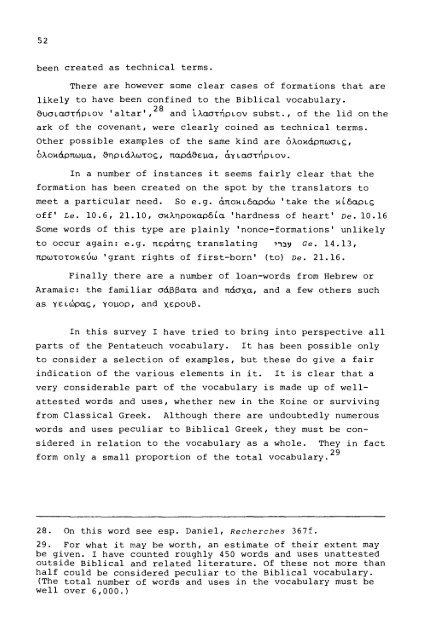A Lexical Study of the Septuagint Version of the Pentateuch
A Lexical Study of the Septuagint Version of the Pentateuch
A Lexical Study of the Septuagint Version of the Pentateuch
You also want an ePaper? Increase the reach of your titles
YUMPU automatically turns print PDFs into web optimized ePapers that Google loves.
een created as technical terms.<br />
There are however some clear cases <strong>of</strong> formations that are<br />
likely to have been confined to <strong>the</strong> Biblical vocabulary.<br />
28 « /<br />
θυσιαστήριον 'altar 1<br />
, and ιλαστηριον subst., <strong>of</strong> <strong>the</strong> lid on <strong>the</strong><br />
ark <strong>of</strong> <strong>the</strong> covenant, were clearly coined as technical terms.<br />
O<strong>the</strong>r possible examples <strong>of</strong> <strong>the</strong> same kind are όλοκάρπωσις,<br />
όλοκάρπωμα, θηριάλωτος, παράθεμα, άγ ιαστηρι,ον.<br />
In a number <strong>of</strong> instances it seems fairly clear that <strong>the</strong><br />
formation has been created on <strong>the</strong> spot by <strong>the</strong> translators to<br />
meet a particular need. So e.g. άποκιδαρόω 'take <strong>the</strong> κίδαρις<br />
<strong>of</strong>f Le. 10.6, 21.10, σκληροκαρδία 'hardness <strong>of</strong> heart' De. 10.16<br />
Some words <strong>of</strong> this type are plainly 'nonce-formations' unlikely<br />
to occur again: e.g. περάτης translating nay Ge. 14.13,<br />
πρωτοτοκεύω 'grant rights <strong>of</strong> first-born' (to) De. 21.16.<br />
Finally <strong>the</strong>re are a number <strong>of</strong> loan-words from Hebrew or<br />
Aramaic: <strong>the</strong> familiar σαββατα and πάσχα, and a few o<strong>the</strong>rs such<br />
as γειώρας, γομορ, and χερουβ.<br />
In this survey I have tried to bring into perspective all<br />
parts <strong>of</strong> <strong>the</strong> <strong>Pentateuch</strong> vocabulary. It has been possible only<br />
to consider a selection <strong>of</strong> examples, but <strong>the</strong>se do give a fair<br />
indication <strong>of</strong> <strong>the</strong> various elements in it. It is clear that a<br />
very considerable part <strong>of</strong> <strong>the</strong> vocabulary is made up <strong>of</strong> well-<br />
attested words and uses, whe<strong>the</strong>r new in <strong>the</strong> Koine or surviving<br />
from Classical Greek. Although <strong>the</strong>re are undoubtedly numerous<br />
words and uses peculiar to Biblical Greek, <strong>the</strong>y must be con<br />
sidered in relation to <strong>the</strong> vocabulary as a whole. They in fact<br />
29<br />
form only a small proportion <strong>of</strong> <strong>the</strong> total vocabulary.<br />
28. On this word see esp. Daniel, Recherches 367f.<br />
29. For what it may be worth, an estimate <strong>of</strong> <strong>the</strong>ir extent may<br />
be given. I have counted roughly 450 words and uses unattested<br />
outside Biblical and related literature. Of <strong>the</strong>se not more than<br />
half could be considered peculiar to <strong>the</strong> Biblical vocabulary.<br />
(The total number <strong>of</strong> words and uses in <strong>the</strong> vocabulary must be<br />
well over 6,000.)

















